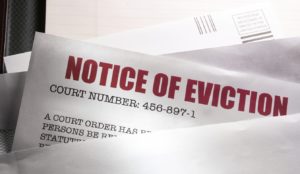 There are numerous factors that contribute to a landlord’s success; one of the most vital is knowing when and how to evict a tenant. If you’re not sure how to evict a tenant or when you can (and can’t) do so, keep reading! We’ll explore the most common reasons landlords evict tenants in this blog post, as well as the stages involved in the eviction process.
There are numerous factors that contribute to a landlord’s success; one of the most vital is knowing when and how to evict a tenant. If you’re not sure how to evict a tenant or when you can (and can’t) do so, keep reading! We’ll explore the most common reasons landlords evict tenants in this blog post, as well as the stages involved in the eviction process.
Understanding Just Cause
Eviction is a legal process in which you must seek a court order to remove a renter from your property, as every Brandon property manager must understand. You can’t just change the locks or throw a tenant’s things out the window. Both measures would be in violation of your tenant’s rights.
You need “just cause” to evict a tenant. The just cause indicates you have a legal justification to evict the tenant, such as property damage, non-payment of rent, or a breach of the lease terms. You cannot lawfully evict a tenant unless you already have just cause.
Reasons You Can Evict
Not paying rent is certainly one of the most common reasons landlords evict their tenants. If your tenant doesn’t pay their rent as agreed, you can give them written notice that they have a set amount of days to pay or vacate the property, as mandated by state statute. If the tenant fails to comply, you may lawfully file for eviction. Just remember to stick to your lease’s conditions as well as any applicable state and local laws.
Property damage is another causative factor for eviction. You can give your tenant a written notice to repair the damage or vacate if they have caused significant damage to the property beyond usual wear and tear. Noncompliance by the tenant means you are within your rights to file for eviction.
A tenant may be evicted for breaking other terms in the contract of the lease as well. For instance, if your renter has an animal and your lease does not allow animals, you can serve a formal notice to leave the property or remove the animal. You can apply for eviction if the tenant refuses to comply. This same procedure applies to all the terms written in the lease.
Reasons You Can’t Evict
Moreover, there are several reasons why you cannot evict a tenant, despite the fact that they have acted in such a way that would necessitate eviction. For example, you cannot legally evict a tenant just because they asked for fixes to the property or objected to the rental unit’s condition. Moreover, it is illegal for you to evict a tenant on the grounds of national origin, religion, familial situation, race, sex, color, or disability. It is illegal to evict a tenant based on these protected distinctions and so any attempt to do so may bring a lawsuit.
The Eviction Process
If you are in the unfortunate case of having to expel a renter, there are some steps you need to consider. First, you must provide a proper written statement for the renter describing the reason for the eviction and the deadline by which they must evacuate the premises. The next step is to go to the court and file an eviction petition and the renter will be duly notified. If the renter fails to come to their appointed court appearance, you can receive a default judgment in your favor. Lastly, if the renter resists eviction, you can get the legal authority in your region to evict them.
Though evicting a tenant is not a nice experience, there are times when it is simply necessary. Eviction is a painful procedure, and knowing why you can (and can’t) do it will help you deal with the hardship of these situations.
If you’re in danger of being evicted, it’s a good idea to seek the counsel of a property management consultant. Contact Real Property Management Empire to speak to a local rental property professional today at 813-867-7300.
We are pledged to the letter and spirit of U.S. policy for the achievement of equal housing opportunity throughout the Nation. See Equal Housing Opportunity Statement for more information.


